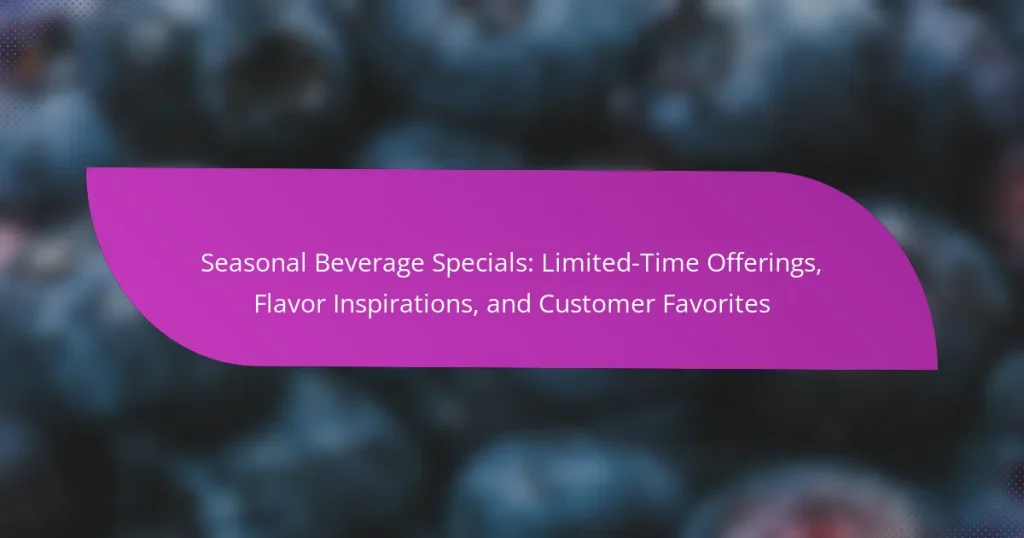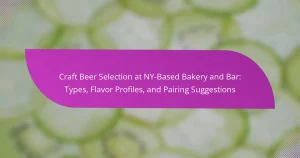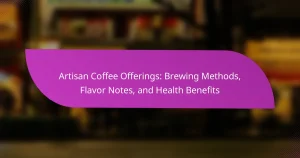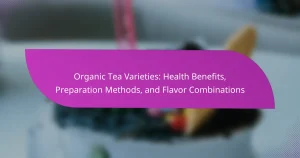Seasonal beverage specials are limited-time drink offerings that highlight unique flavors and ingredients inspired by specific seasons or holidays. Popular examples include the Pumpkin Spice Latte, Eggnog Latte, and Peppermint Mocha, which attract customer interest and drive sales during fall and winter. Retailers create these specials to enhance customer engagement and encourage repeat purchases, often utilizing social media and in-store promotions for marketing. By analyzing customer preferences and trends, businesses can develop their own seasonal offerings, ensuring they resonate with consumers and generate excitement. Tracking sales data is essential for assessing the success of these limited-time beverages for future planning.
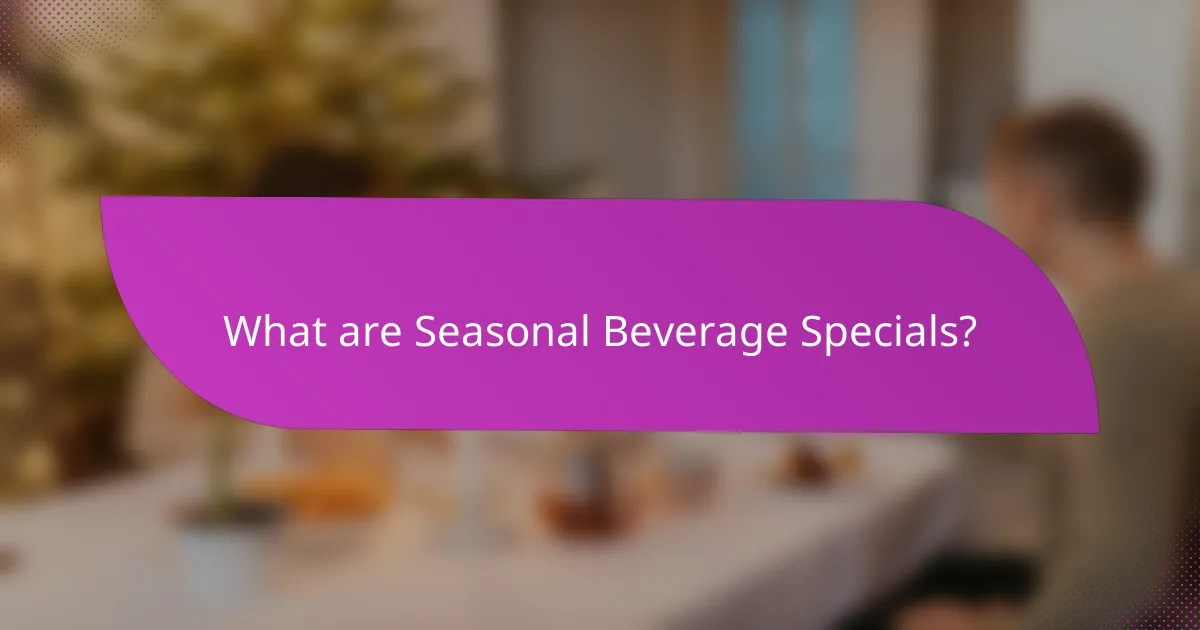
What are Seasonal Beverage Specials?
Seasonal beverage specials are limited-time drink offerings that reflect specific seasons or holidays. These beverages often feature unique flavors and ingredients inspired by seasonal produce. For example, pumpkin spice lattes are popular in the fall, while refreshing iced drinks may be featured in summer. Retailers use seasonal specials to attract customers and create excitement. These offerings can boost sales during specific times of the year. Seasonal beverage specials often become customer favorites, leading to repeat purchases.
How do Seasonal Beverage Specials differ from regular offerings?
Seasonal Beverage Specials differ from regular offerings primarily in their limited-time availability and unique flavor profiles. Regular offerings are typically available year-round, providing consistent options for customers. In contrast, seasonal specials are introduced to celebrate specific seasons or holidays, creating excitement and urgency. These beverages often feature ingredients that are associated with particular times of the year, such as pumpkin spice in fall or peppermint during winter. The introduction of these specials can lead to increased customer interest and sales during the promotional period. Additionally, seasonal specials may incorporate innovative recipes that are not part of the regular menu, enhancing the overall customer experience.
What factors influence the creation of Seasonal Beverage Specials?
Seasonal Beverage Specials are influenced by several key factors. These include seasonal ingredients, consumer trends, and cultural events. Seasonal ingredients dictate the flavors available at different times of the year. For example, pumpkin is popular in fall, while fresh berries are common in summer. Consumer trends also play a significant role. Health-conscious choices or unique flavor combinations can drive the development of new beverages. Cultural events, such as holidays, can inspire themed drinks. For instance, peppermint is often featured during winter holidays. Additionally, competition among brands can lead to innovative offerings to attract customers. These factors collectively shape the creation of Seasonal Beverage Specials.
Why are Seasonal Beverage Specials important for businesses?
Seasonal beverage specials are important for businesses because they drive customer engagement and sales. These limited-time offerings create a sense of urgency, encouraging customers to make purchases before the items are no longer available. According to a study by the National Restaurant Association, 65% of consumers are more likely to visit a restaurant that offers seasonal menu items. Seasonal specials also allow businesses to showcase unique flavors that resonate with customers’ seasonal preferences. This not only enhances customer satisfaction but also differentiates the brand from competitors. Furthermore, seasonal promotions can lead to increased foot traffic and customer loyalty, as consumers often seek out these exclusive offerings.
What are the typical attributes of Seasonal Beverage Specials?
Seasonal Beverage Specials typically feature unique flavors, limited availability, and thematic presentations. Unique flavors often reflect seasonal ingredients, such as pumpkin in fall or peppermint in winter. Limited availability creates urgency among customers, encouraging them to try the beverage before it’s gone. Thematic presentations enhance the overall experience, often incorporating festive decorations or seasonal packaging. Seasonal Beverage Specials also tend to have promotional pricing to attract customers. They are often marketed through social media and in-store displays to maximize visibility. These attributes collectively enhance customer engagement and satisfaction during specific times of the year.
What flavors are commonly featured in Seasonal Beverage Specials?
Common flavors featured in Seasonal Beverage Specials include pumpkin spice, peppermint, and eggnog. Pumpkin spice is a popular fall flavor, often associated with lattes and desserts. Peppermint is frequently used in winter beverages, especially hot chocolates and coffees. Eggnog flavors are typically offered during the holiday season, often in coffee or as standalone drinks. Other flavors may include gingerbread and chai, which reflect seasonal spices and warmth. These flavors resonate with consumer preferences during specific times of the year, enhancing the festive experience.
How do Seasonal Beverage Specials reflect seasonal trends?
Seasonal beverage specials reflect seasonal trends by incorporating flavors and ingredients that are popular during specific times of the year. For example, pumpkin spice lattes are prevalent in fall, aligning with the harvest season. These beverages often feature seasonal fruits, spices, and herbs, enhancing their relevance.
Additionally, summer drinks may include refreshing ingredients like lemonade or tropical fruits, catering to warmer weather preferences. Seasonal promotions capitalize on consumer nostalgia and cultural traditions associated with holidays.
Market research indicates that 60% of consumers enjoy trying limited-time seasonal offerings. This trend demonstrates a strong connection between beverage specials and seasonal consumer behavior.
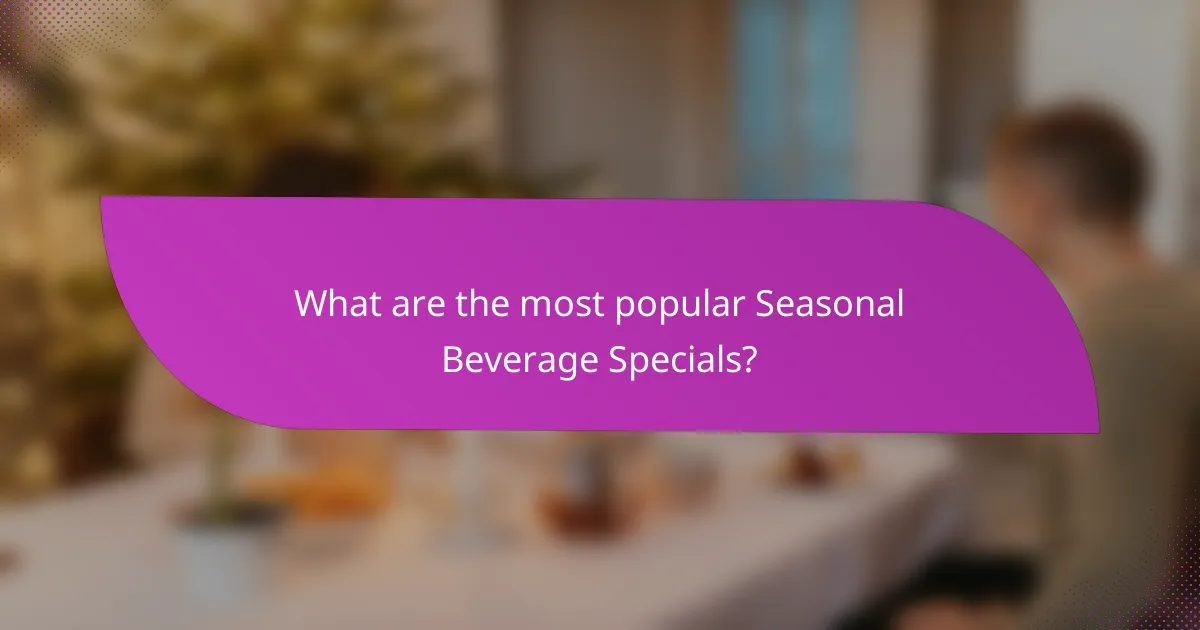
What are the most popular Seasonal Beverage Specials?
The most popular seasonal beverage specials include Pumpkin Spice Latte, Eggnog Latte, and Peppermint Mocha. These drinks are typically featured in fall and winter. The Pumpkin Spice Latte has gained a cult following since its introduction in 2003. Eggnog Latte is a classic holiday drink that combines espresso with eggnog. Peppermint Mocha blends chocolate and peppermint flavors, appealing to many during the festive season. These beverages often generate significant sales spikes during their availability. They are frequently advertised through social media and in-store promotions.
Which Seasonal Beverage Specials have become customer favorites?
Pumpkin Spice Latte and Peppermint Mocha have become customer favorites among seasonal beverage specials. These beverages are widely recognized for their unique flavors and seasonal appeal. The Pumpkin Spice Latte features a blend of espresso, steamed milk, pumpkin, and warm spices. It typically launches in early fall, attracting many customers. The Peppermint Mocha combines espresso, steamed milk, and peppermint syrup, usually available during the winter holiday season. Both drinks have consistently high sales and customer satisfaction ratings. Seasonal promotions often highlight these favorites, leading to increased demand each year.
What makes these favorites stand out among other offerings?
These favorites stand out due to their unique flavors and limited availability. Seasonal ingredients enhance their taste and appeal. Customers often seek these beverages for a fresh experience. The exclusivity creates urgency, driving demand. High-quality ingredients elevate the overall flavor profile. Creative combinations differentiate them from regular offerings. Seasonal promotions often include festive themes, enhancing customer engagement. Collectively, these factors contribute to their popularity and distinctiveness in the market.
How do customer preferences shape Seasonal Beverage Specials?
Customer preferences significantly shape Seasonal Beverage Specials by influencing flavor choices and promotional strategies. Seasonal offerings often reflect popular tastes and trends among consumers. For instance, pumpkin spice beverages gain popularity each fall due to customer demand. Research indicates that 70% of consumers prefer seasonal flavors that resonate with their personal experiences and traditions. Additionally, beverage companies analyze sales data and customer feedback to refine their seasonal menus. This data-driven approach ensures that the specials align with consumer interests. Ultimately, customer preferences drive the creation and success of these limited-time offerings.
What are some examples of successful Seasonal Beverage Specials?
Pumpkin Spice Latte from Starbucks is a prime example of a successful seasonal beverage special. Launched in 2003, it has become a cultural phenomenon. The drink generates significant sales each fall, contributing to Starbucks’ revenue growth. Another example is the Peppermint Mocha, also from Starbucks, which has a loyal customer base during the winter months. Dunkin’ Donuts offers a seasonal Maple Pecan flavor that attracts customers each autumn. These beverages leverage seasonal flavors to create excitement and drive customer traffic. Seasonal specials often lead to increased brand loyalty and repeat purchases.
How have brands leveraged Seasonal Beverage Specials to boost sales?
Brands have leveraged Seasonal Beverage Specials to boost sales by creating limited-time offerings that attract customers. These specials generate excitement and urgency among consumers. Seasonal flavors often align with holidays or events, enhancing their appeal. For instance, pumpkin spice lattes in fall drive significant traffic to coffee shops. Promotions and marketing campaigns around these beverages increase visibility and engagement. Research shows that limited-time offers can increase sales by up to 20%. Additionally, brands utilize social media to promote these specials, reaching a wider audience. This strategy effectively enhances customer loyalty and repeat purchases during the season.
What marketing strategies are effective for promoting Seasonal Beverage Specials?
Effective marketing strategies for promoting Seasonal Beverage Specials include social media campaigns, email marketing, and in-store promotions. Social media campaigns leverage visual content to showcase seasonal drinks, attracting customer attention. Platforms like Instagram and Facebook are ideal for sharing enticing images and videos. Email marketing targets existing customers with personalized offers and updates about new seasonal beverages. In-store promotions create a sensory experience, allowing customers to sample drinks and engage with staff. Collaborations with local influencers can also enhance visibility and credibility. Seasonal themes in marketing materials create a sense of urgency, encouraging customers to try limited-time offerings. According to a study by Nielsen, promotions can increase sales by up to 20% during peak seasons.
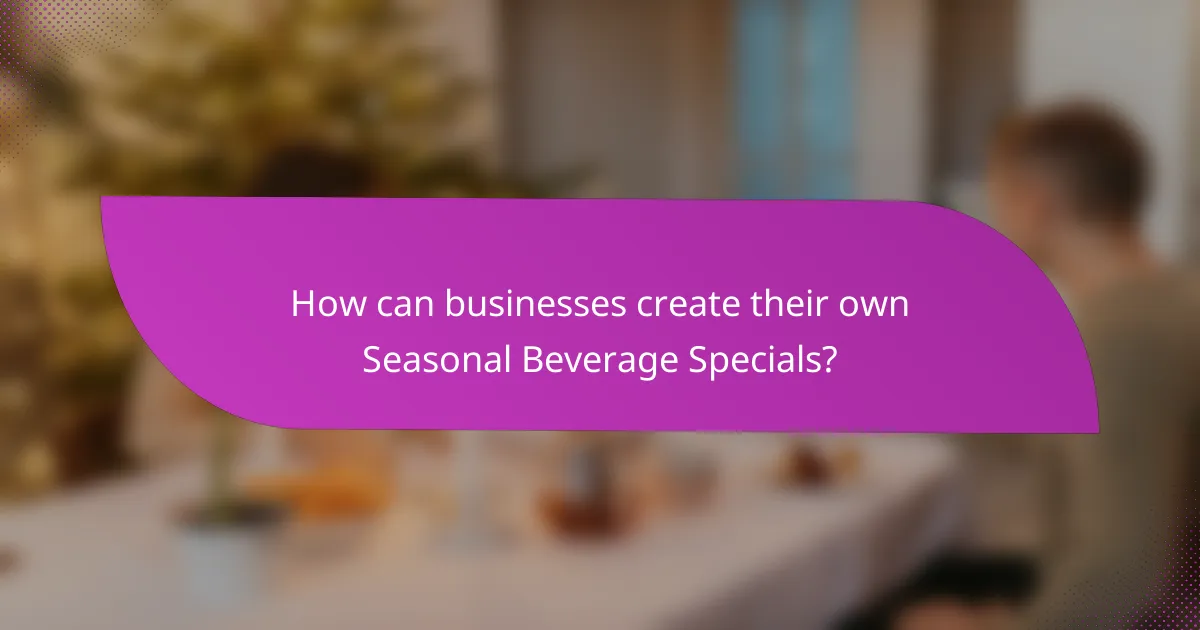
How can businesses create their own Seasonal Beverage Specials?
Businesses can create their own seasonal beverage specials by identifying popular seasonal flavors. They should analyze customer preferences and trends to select flavors that resonate. Seasonal ingredients, such as pumpkin in fall or peppermint in winter, can inspire unique recipes. Testing recipes in small batches allows for refinement based on customer feedback. Marketing these specials through social media and in-store promotions can generate excitement. Limited-time offerings create urgency and encourage customers to try new products. Tracking sales data helps assess the success of each special for future planning.
What steps should businesses take to develop Seasonal Beverage Specials?
Businesses should conduct market research to develop Seasonal Beverage Specials. This involves analyzing customer preferences and seasonal trends. Identifying popular flavors during specific seasons is essential. Collaborating with suppliers for fresh, seasonal ingredients enhances quality. Creating unique and visually appealing presentations attracts customers. Testing recipes internally ensures consistency in taste and quality. Promoting specials through marketing channels increases visibility. Collecting customer feedback helps refine future offerings.
How can businesses gather customer feedback to inform their offerings?
Businesses can gather customer feedback through surveys, social media, and direct interactions. Surveys can be distributed via email or in-store. They help collect structured responses about customer preferences. Social media platforms allow customers to share opinions publicly. Monitoring comments and messages provides insights into customer sentiments. Direct interactions, such as conversations with staff, can reveal immediate feedback. Additionally, businesses can use feedback forms at the point of sale. Analyzing this feedback helps inform product offerings and seasonal specials. According to a study by the Harvard Business Review, companies that actively seek customer feedback are more likely to innovate successfully.
What role does ingredient sourcing play in creating Seasonal Beverage Specials?
Ingredient sourcing is crucial in creating Seasonal Beverage Specials. It determines the quality and flavor profile of the beverages. High-quality, fresh ingredients enhance taste and appeal. Seasonal sourcing allows businesses to utilize ingredients at their peak freshness. This practice can lead to unique flavor combinations that resonate with customers. Additionally, sourcing local ingredients supports community economies. It also aligns with sustainability efforts, appealing to environmentally conscious consumers. Research shows that 70% of consumers prefer beverages made from locally sourced ingredients. This preference influences purchasing decisions and boosts sales.
What are some best practices for launching Seasonal Beverage Specials?
Best practices for launching seasonal beverage specials include thorough market research and creative flavor development. Understanding customer preferences helps tailor offerings. Seasonal promotions should align with current trends and holidays. Clear communication through marketing channels is essential. Engaging visuals attract attention and enhance appeal. Sampling events can generate excitement and encourage trial. Pricing strategies should reflect perceived value while remaining competitive. Monitoring customer feedback informs future adjustments and innovations.
How can social media be utilized to promote Seasonal Beverage Specials?
Social media can effectively promote Seasonal Beverage Specials by leveraging visual content and targeted advertising. Engaging images and videos of the beverages can attract attention and entice customers. Platforms like Instagram and Facebook allow businesses to showcase these seasonal offerings through eye-catching posts.
Utilizing hashtags related to the season can enhance visibility. Engaging with followers through polls or contests can create excitement around the specials. Additionally, sharing customer reviews and testimonials can build trust and encourage others to try the beverages.
According to a 2021 survey by Sprout Social, 70% of consumers have purchased a product after seeing it on social media. This statistic underscores the effectiveness of social media in driving sales for seasonal promotions.
What are common pitfalls to avoid when introducing Seasonal Beverage Specials?
Common pitfalls to avoid when introducing Seasonal Beverage Specials include inadequate market research. Failing to understand customer preferences can lead to unappealing flavors. Another pitfall is poor timing in launching the specials. Seasonal drinks should align with customer expectations for the time of year. Additionally, neglecting staff training can result in inconsistent product quality. Staff should understand the ingredients and preparation methods. Marketing mishaps can also occur if promotions are not clear or engaging. Effective communication of the special offerings is crucial. Lastly, setting unrealistic sales expectations can lead to disappointment. Clear goals should be established based on historical sales data.
How can businesses ensure the success of their Seasonal Beverage Specials?
Businesses can ensure the success of their Seasonal Beverage Specials by focusing on effective marketing strategies. Engaging social media campaigns can create buzz around the specials. Utilizing visually appealing images of the beverages can attract customer interest. Offering limited-time promotions encourages urgency among customers. Collaborating with local influencers can expand reach and credibility. Additionally, gathering customer feedback can help refine future offerings. Research shows that businesses with strong seasonal promotions see a 20% increase in sales during the promotional period.
Seasonal beverage specials are limited-time drink offerings that highlight unique flavors and ingredients inspired by specific seasons or holidays. This article explores the significance of these specials for businesses, detailing how they differ from regular offerings and the factors influencing their creation. It also examines popular flavors, customer favorites, and effective marketing strategies, emphasizing the role of customer preferences and ingredient sourcing in developing successful seasonal drinks. Additionally, best practices for launching these specials and common pitfalls to avoid are discussed, providing a comprehensive overview of how businesses can leverage seasonal beverage specials to drive sales and customer engagement.
